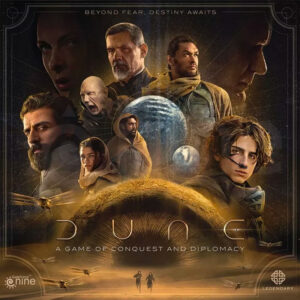 Every game has an intended setting, tone, purpose, and audience. This isn’t to say that a game can’t be played outside of this configuration, but usually when a game meets the designer’s intentions, the theme and mechanisms chart the players through a narrative, social, or strategic challenge. Players should be cautioned against trying too hard to make every game fit every occasion. This is especially true with the epic scope of the original Dune game, first published in 1979 by Avalon Hill. At that time, tabletop gaming was entering a phase with epic stories from all sorts of genres via roleplaying games or the thriving hex-and-counter game scene.
Every game has an intended setting, tone, purpose, and audience. This isn’t to say that a game can’t be played outside of this configuration, but usually when a game meets the designer’s intentions, the theme and mechanisms chart the players through a narrative, social, or strategic challenge. Players should be cautioned against trying too hard to make every game fit every occasion. This is especially true with the epic scope of the original Dune game, first published in 1979 by Avalon Hill. At that time, tabletop gaming was entering a phase with epic stories from all sorts of genres via roleplaying games or the thriving hex-and-counter game scene.
Alas, the pace of gaming back then barely keeps up with the myriad of distractions players are burdened with today. Gaming today, on the whole, is an affair dotted with shorter play experiences. Even games of 120 minutes can seem long to some audiences. And yet, many times, those players crave the feeling that a longer epic title might offer. So, many publishers have tried to redesign and repackage longer games into a shorter space via a card game, roll-and-write, or two-player title.
Likely with this squarely in mind, Gale Force Nine has done the same for the original Dune game. This feat is called Dune: A Game of Conquest and Diplomacy. It hits the one hour mark square on the nose. To get this playtime, it reduces complexity and player count while capping the playing rounds from the original. But is it still epic? Keep reading to find out.
Gameplay Overview:
The setting of Dune is, of course, the planet Arrakis where four player factions are fighting for control. The Imperium, Atreides, Harkonnen, and Fremen are in attendance, waiting for troops and leaders to be deployed to a circular map of the planet. The sandstorm (storm sector) which moves like a reverse clock dial from the original game is retained and serves the same purpose of wiping out units unprotected by rock territories or strongholds.
The game moves through seven phases over a maximum of five rounds. Any player who controls at least 3 strongholds by the end of rounds 3, 4, or 5 wins the game. If no player manages to do this, players will receive points for controlling strongholds and points for Spice held.
The seven phases of the game produce the real tension. They are as follows:
Storm: The storm sector moves around the map as determined by a die roll. If a specific die face is rolled, the first player may choose how far the storm moves, ideally destroying unprotected forces of opponents.

Spice Blow: As the main currency of the game, Spice will randomly show up on the map through a card draw done during this phase. There’s one catch. Any existing Spice or units currently in the territory indicated are destroyed.
Gain Cards: Players will automatically get a hand of up to 4 Battle cards, but they may also acquire Market cards by paying Spice.
Revival: Destroyed troops or leaders are not gone forever. During this phase players can pay Spice to send units back to their reserves, waiting to be deployed or used again.
Shipping and Movement: Players may deploy and then move units around the map.

Battle: If units from two or more factions occupy the same territory, a battle occurs. Each player takes a Battle Wheel and secretly indicates how many troops they are committing to the battle. This is also the maximum number of units they can have defeated. In addition, players can select one of their leader discs and any Battle cards they wish to commit. Both of these could add to a player’s Battle Strength, which is the combined total of card values and unit values. There’s one catch: If the opposing player plays a Traitor card for a selected Leader, they are removed from the battle.
Spice Collection: The final phase of the round allows players in the territories with Spice to collect 1 Spice per 2 troops in the territory.
Additionally, one of the big hand-me-downs to this Dune from its older brother are the specific asymmetrical player abilities. One of the main abilities of the Fremen is not to be destroyed by the storm, for example, but each faction has a “particular set of skills” as Mr. Bryan Mills would say if he was asked to play. They’re scaled down a bit from the original and all antagonize each opposing faction well.
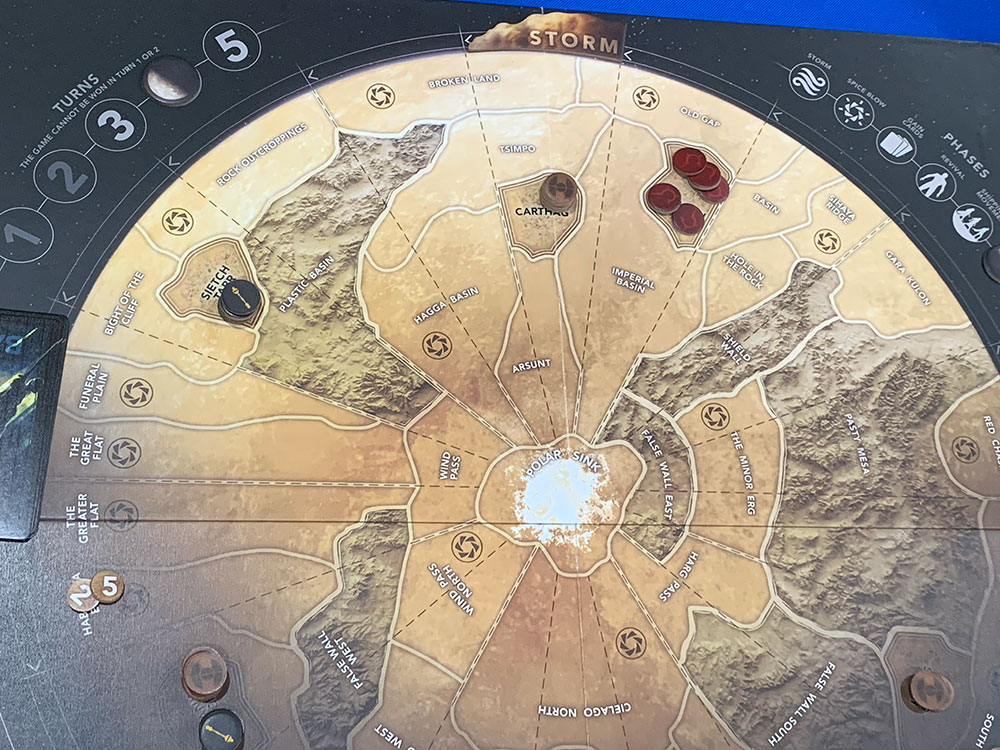
Game Experience:
Is Dune: A Game of Conquest and Diplomacy good? Is it a good scaled-down or scaled-back version of the original? Unfortunately, this reviewer has not played the original, but having watched a game being played and having experienced what this box offers, the answer to those questions really depends on what players want to get out of the game.
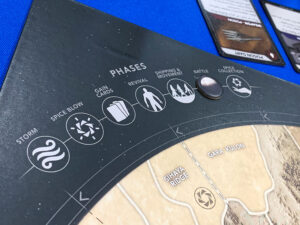
One of the most impressive things from the original game is the epic scope and scale of the intrigue present, especially at six players and with a full 15 rounds. Not only are the making and breaking of alliances part of the game, but the nature of competition for board space and control of territories limits the Spice collection to a degree. Combined with some of the faction powers, the original Dune is a scheming hot pot of treachery.
Now, if players are like yours truly, with no direct experience of the original, Dune: A Game of Conquest and Diplomacy will likely seem underwhelming. The closest comparable game is actually poker with an area control board game. However, the board tension is not as good as many other area control games. The tension presented by battles with each player revealing their hand and comparing betrayals and counter betrayals is enjoyable, but this boiled down version is all the game offers. By scaling the play to only four players and a limited number of rounds, it’s like telling poker night that you’ll only play five hands. Then, after that, the player with the most money wins. It’s fine. It works. But it’s not epic and not deserving of the scale of the source IP.
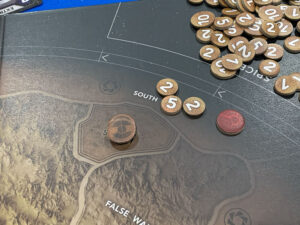
Here specifically, it’s hard to point to a single thing that didn’t work in this version. The art is good. The game presents play that is interesting even if the units on the board fail to drive tension. The battles are mostly interesting, and there are some stories to tell after it all. But it’s all so short. By scaling back the game to meet limitations of player attention span or competition from much shorter games, Gale Force Nine is doing a disservice to the game concept as a whole. Then again, maybe the original game is overwrought and repetitive (15 rounds vs. 5). It’s hard to say, but it does feel like with a little more effort, Gale Force Nine could have brewed something tastier with significantly more spice.
Final Thoughts:
Seeking to capitalize on their license for Dune games, publisher Gale Force Nine has produced a “good-enough” version of the original 1979 board game. The tension and abilities of the four included factions are present now with a shortened playtime. However, in cutting down the experience in time, GF9 also cuts down the experience in feel. By removing the length in the game, they have also subverted the tone and epic struggle as a whole. For those looking to relive what the original game was, Dune: A Game of Conquest and Diplomacy is a fine offering.
Final Score: 3 Stars – Players who love Dune and poker should check it out, as long as they like poker night to last only an hour.
 Hits:
Hits:
• Playtime accurately hits the mark
• Boiled down version of the original game
• Tension with each battle
Misses:
• Boiling down the game removes the “epicness”
• Good only for those who enjoy the theme







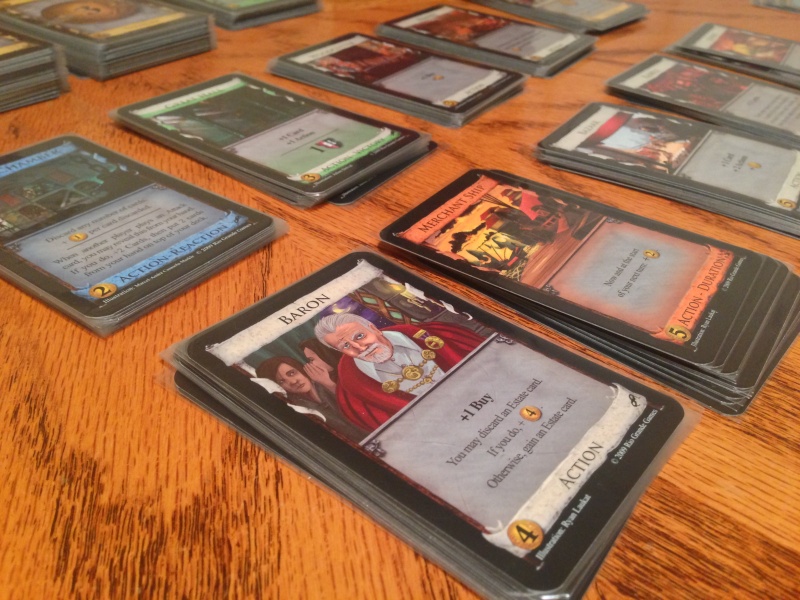















I agree completely and would go a step farther to say this version is just a little too light to make it into a lot of rotations beyond being a filler. This game is good if you simply don’t have time or player count to play the main game. It also works if you want to introduce new players to the game mechanics in hopes of seducing them to play the original. But in almost every session we played, the game ends too soon and many of the victories were very hollow. You definitely run into that classic Risk problem of last-turn victory rushes.
I am surprised that the game is compared.to the 70s Version instead of looking at the 2019 version, which already Made the Game More accessible, without losing the interesting parts. It is capped at ten rounds which are rarely reached. 120 min is the usual time to Play (for advanced Players).
To me this new edition wants to bei sold well to the audience Of the movie and repurposes an old Game Design.
Not having played the new title, I cant judge about the funfactor, but missing out key game elements like the auction for hidden cards (and only atreides knows whats in it) ist a sign that in particular the “diplomacy” part of the game title might be…well…only in the title.